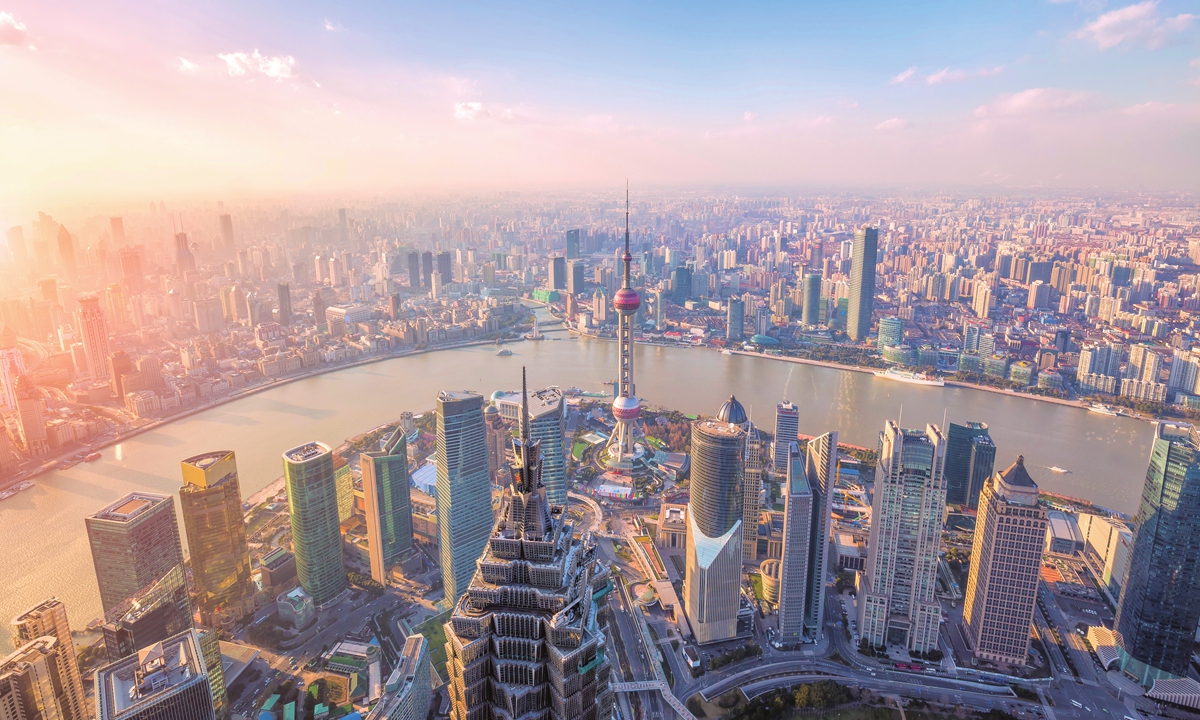After overcoming a tough Q2, Shanghai gears up for economic recovery in H2
Officials highlight achievements in past decade, vow greater efforts

Aerial view of Shanghai Photo: VCG
Shanghai officials on Monday highlighted the city's remarkable achievements over the past decade and vowed further efforts in building the city into a world-class metropolitan spearheading the country's reform and opening-up efforts and the pursuit of high-quality development in coming years and decades.
After overcoming a tough period in the second quarter due to COVID-19 outbreaks, Shanghai is also poised to boost economic recovery in the second half of the year, which is vital in the country's efforts to ensure stable growth, analysts noted on Monday.
Shanghai's economy suffered a heavy blow in the second quarter, when the city entered into "static management" for two months, sending its GDP down by 13.7 percent year-on-year. Contraction in the city also had a regional and national impact, as rippling disruptions were felt in the Yangtze River Delta, hitting industries such as vehicles.
However, as it pushes forward with a rapid recovery from COVID-19, Shanghai will emerge as the spearhead of further reform and opening-up as well as technology and innovation, according to a press conference held on Monday to highlight the city's remarkable achievements in the past decade.
Shanghai Mayor Gong Zheng said that since the 18th National Congress of the Communist Party of China in 2012, Shanghai has seen remarkable achievements in various areas, with the city's GDP more than doubled. Going forward, Gong vowed that Shanghai will strive for greater achievements in areas such as reform and opening-up efforts and the push for high-quality development.
Shanghai's key role will be at the center of a bigger picture. A top economic meeting in late July called for efforts to strive for the "best result" in the second half of the year, urging provinces with suitable conditions to meet their annual growth targets and vowing to give full play to the initiatives of enterprises and entrepreneurs, and attract foreign companies to invest.
Shanghai's actual use of foreign capital maintained growth in the first half of this year, exceeding $12 billion, and the city added 26 regional headquarters of multinational companies and 10 foreign-funded research and development centers, Vice Mayor Wu Qing said at the press conference on Monday.
"Shanghai's economic size and the scale of its manufacturing industries are a significant part of the Chinese economy, but its leadership role in technology, innovation and emerging industries, as the locomotive of China's strategic and emerging industries, is even more important," Lian Ping, head of Zhixin Investment Research Institute, told the Global Times on Monday.
Lian said that the city's semiconductor foundries, as well as its pharmaceutical producers and vehicle component makers, would power downstream industries across the country.
Lian said that a few foreign companies are leaving China, but those with an eye on China's vast consumer market, now larger than that of the US and the EU combined and with more potential given the low level of penetration of consumer items, will stay and increase their presence.
From new-energy vehicles to robots to smart devices, foreign companies will only increase their stakes in China and Shanghai is their port of entry. Lian predicted that the China International Import Expo (CIIE) this year will also set new records despite economic headwinds.
The fifth CIIE will be held as scheduled, with all preparatory work steadily progressing, Gong said during the press conference.
More than 270 of the world's top 500 and industry leading enterprises have signed contracts, and over 50 countries have confirmed online participation.
"We will continue to provide first-class services and a first-class environment, maximizing the role of the fair in linking China and the world," the mayor said.
Last year, the city's actual foreign investment reached $22.55 billion, and Shanghai retained its status as one of the most popular destinations for foreign investors.
Xi Junyang, a professor of finance at the Shanghai University of Finance and Economics, told the Global Times on Monday that there are a number of areas where key progress can be expected in the second half of the year, including faster growth in the city's financial sector as the Shanghai government and financial institutions are going all out to make up for the losses in the first half of the year.
Xi said that it's possible that China will launch a nationwide registration-based IPO system in the second half of this year, which will have a positive effect on Shanghai's capital market.
Shanghai's financial industry also stands to benefit from possible reserve requirement ratio cuts and interest rate cuts in the second half of this year, Xi said.
The ChiNext board might usher in the market maker system, which will provide a positive influence for the Science and Technology Innovation Board as well, he added.
Total financial transactions have increased from 528 trillion yuan to 2.5 quadrillion in the past decade, and Shanghai port's container throughput has ranked first in the world for 12 consecutive years, according to official data.
Shanghai's Lingang Area said last year that it will build a chip hub targeting the Asia-Pacific region over a five-year period, eyeing an expansion in the scale of the integrated circuit industry to over 100 billion yuan by 2025.
The city also released a five-year plan for metaverse development in 2021 to develop the industry to 350 billion yuan before 2025.



